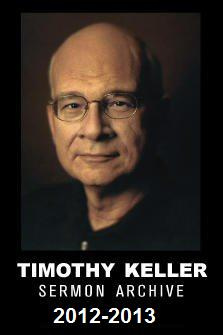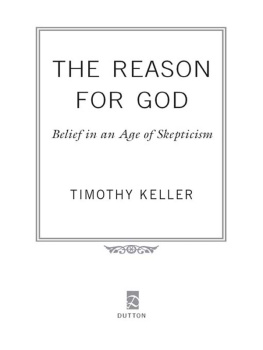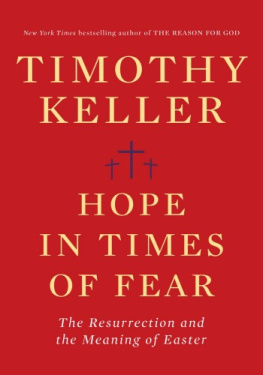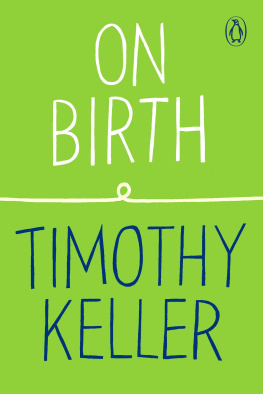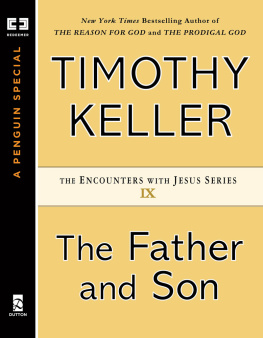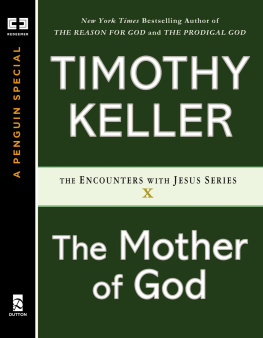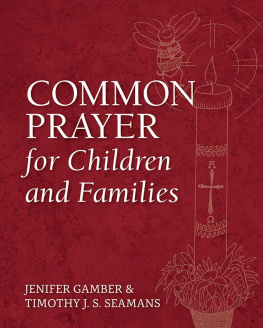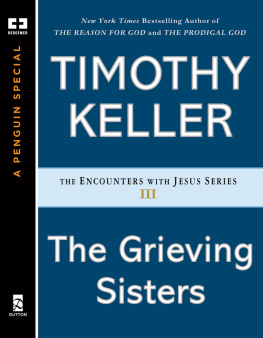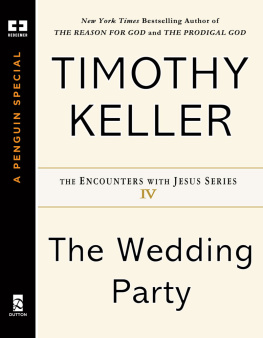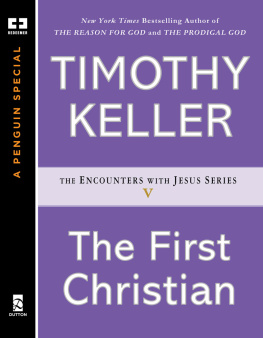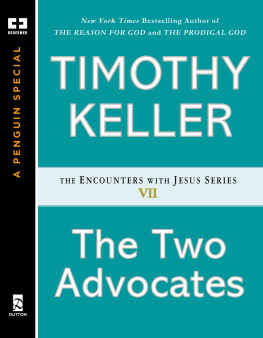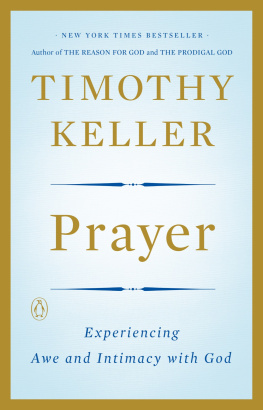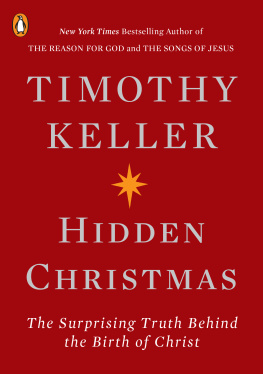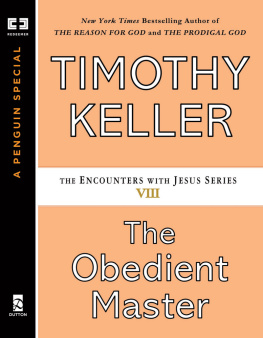A LSO BY T IMOTHY K ELLER
THE REASON FOR GOD: Belief in an Age of Skepticism
THE PRODIGAL GOD: Recovering the Heart of the Christian Faith
COUNTERFEIT GODS: The Empty Promises of Money, Sex, and Power, and the Only Hope That Matters
GENEROUS JUSTICE: How Gods Grace Makes Us Just
JESUS THE KING: Understanding the Life and Death of the Son of God
THE MEANING OF MARRIAGE: Facing the Complexities of Commitment with the Wisdom of God
EVERY GOOD ENDEAVOR: Connecting Your Work to Gods Work
WALKING WITH GOD THROUGH PAIN AND SUFFERING
ENCOUNTERS WITH JESUS: Unexpected Answers to Lifes Biggest Questions

Published by the Penguin Group
Penguin Group (USA) LLC
375 Hudson Street
New York, New York 10014

USA | Canada | UK | Ireland | Australia | New Zealand | India | South Africa | China
penguin.com
A Penguin Random House Company
Copyright 2014 by Timothy Keller
Penguin supports copyright. Copyright fuels creativity, encourages diverse voices, promotes free speech, and creates a vibrant culture. Thank you for buying an authorized edition of this book and for complying with copyright laws by not reproducing, scanning, or distributing any part of it in any form without permission. You are supporting writers and allowing Penguin to continue to publish books for every reader.
All Bible references are from the New International Version (NIV), unless otherwise noted.
LIBRARY OF CONGRESS CATALOGING-I N-PUBLICATION DATA
has been applied for.
ISBN 978-0-698-16140-5
While the author has made every effort to provide accurate telephone numbers, Internet addresses, and other contact information at the time of publication, neither the publisher nor the author assumes any responsibility for errors or for changes that occur after publication. Further, the publisher does not have any control over and does not assume any responsibility for author or third-party websites or their content.
To Dick Kaufmann, friend and man of prayer
C ONTENTS
Introduction
Why Write a Book on Prayer?
S ome years ago I realized that, as a pastor, I didnt have a first book to give someone who wanted to understand and practice Christian prayer. This doesnt mean there arent great books on prayer. Many older works are immeasurably wiser and more penetrating than anything I could possibly produce. The best material on prayer has been written.
Yet many of these excellent books are written in an archaic idiom inaccessible to most contemporary readers. In addition they tend to be primarily theological or devotional or practical, but seldom do they combine the theological, experiential, and methodological all under one cover. A book on the essentials of prayer should treat all three. Also, nearly all the classic books on prayer spend a fair amount of time warning readers about practices in their day that were spiritually unhelpful or even damaging. Such cautions must be updated for readers living in each generation.
Two Kinds of Prayer?
Recent writers on prayer tend to have one of two views on the subject. Most now emphasize prayer as a means to experience Gods love and He begins with the premise that a sense of the absence of God is the norm for the Christian at prayer, and that the experience of Gods presence is difficult for most people to find.
Another book with the same approach is Donald G. Bloeschs The Struggle of Prayer. He criticizes what he calls Christian mysticism. Prayer is not mainly for an inner state but for conformity to Gods purposes.
What accounts for these two viewswhat we could call communion-centered and kingdom-centered prayer? One explanation is that they reflect peoples actual experience. Some discover that their emotions are unresponsive toward God and that even paying attention in prayer for more than a few minutes is extremely difficult. Others regularly experience a feeling of Gods presence. This accounts at least in part for the different views. However, theological differences also play a role. Bloesch argues that mystical prayer fits more with the Catholic view that Gods grace is infused directly into us through baptism and the Mass rather than with the Protestant belief that we are saved through faith in Gods word of gospel promise.
Which view of prayer is the better one? Is peaceful adoration or assertive supplication the ultimate form of prayer? That question assumes that the answer is completely either-or, which is unlikely.
Communion and Kingdom
For help, we should turn first to the Psalms, the inspired prayer book of the Bible. There we see that both experiences of prayer are well represented. There are Psalms such as Psalm 27, 63, 84, 131, and the long hallelujah of Psalms 146150 that depict adoring communion with God. In Psalm 27:4, David says that there is one primary thing he asks of the Lord in prayerto gaze on the beauty of the Lord. While David did in fact pray for other things, he means at the very least that nothing is better than to know the presence of God. Therefore he says: O God... my soul thirsts for you.... I have seen you in the sanctuary and beheld your power and your glory. Because your love is better than life, I will praise you (Ps 63:13). When he adores God in his presence, he says his soul is satisfied as with the richest of foods (Ps 63:5). This is indeed communion with God.
There are, however, even more Psalms of complaint, of cries for help, and of calls for God to exercise his power in the world. There are also stark expressions of the experience of Gods absence. Here we indeed see prayer as a struggle. Psalms 10, 13, 39, 4243, and 88 are just a very few examples. Psalm 10 begins asking why God stands far off and hides himself in times of trouble. Suddenly the author cries, Arise, Lord! Lift up your hand, O God. Do not forget the helpless (Ps 10:12). Yet then he seems to speak almost to himself as well as to the Lord. But you, O God, do see trouble and grief. You consider it to take it to hand.... You are the helper of the fatherless (Ps 10:14). The prayer ends with the psalmist bowing to Gods timing and wisdom in all matters yet still fiercely calling out for justice on the earth. This is the wrestling match of kingdom-centered prayer. The Psalter, then, affirms both the communion-seeking and kingdom-seeking kinds of prayer.
Besides looking at the actual prayers of the Bible, we should consider also the Scriptures theology of prayerthe reasons in God and in our created nature that human beings are able to pray. We are told that Jesus Christ stands as our mediator so that we, though undeserving in ourselves, can boldly approach Gods throne and cry out for our needs to be met (Heb 4:1416; 7:25). We are also told that God himself dwells within us through the Spirit (Rom 8:911) and helps us to pray (Rom 8:2627) so that even now by faith we may gaze and contemplate the glory of Christ (2 Cor 3:1718). Thus the Bible gives us theological support for both communion-centered and kingdom-centered prayer.
A little reflection will show us that these two kinds of prayer are neither opposites nor even discrete categories. Adoring God is shot through with supplication. To praise God is to pray hallowed be thy name, to ask him to show the world his glory so that all would honor him




